

Pegasus greek mythology. Pegasus greek mythology - Recherche Google. Pegasus. List of Greek mythological figures. Bellerophon, hero known for defeating Chimera - Greek Gods. Bellerophon was a famous Greek hero, mostly known for defeating Chimera, a fire-breathing mythical monster. He was also recognised by riding white Pegasus which was a sort of a gift from Athena for his devotion to the goddess.
Bellerophon was, according to Homer's Iliad, a son of Glaucus and Eurymede of Corinth. Alternatively, according to Apollodorus and Hesiod's catallouges by Hyginus, he was a son of Poseidon by Eurymede which makes him a semi-god. Personally, I placed him among semi-gods because it consists with the story when Bellerophon called his father to help him, upon finding out the plot against him. BELLEROPHON (Bellerophontes) - Hero of Greek Mythology. Bellerophon. Etymology[edit] One possible etymology that has been suggested is: Βελλεροφόντης from βέλεμνον, βελόνη, βέλος ("projectile, dart, javelin, needle, arrow, bullet") and -φόντης ("slayer") from φονεύω ("to slay").
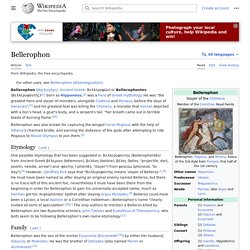
However, Geoffrey Kirk says that "Βελλεροφόντης means 'slayer of Belleros'".[3] Belleros could have been a Lycian, a local daimon or a Corinthian nobleman—Bellerophon's name "clearly invited all sorts of speculation".[3] Greek characters in bellerophon and chimera - Recherche Google. Chimera. Chimera. Chimera. Jason. Perseus. Bellerophon - Recherche Google. Glaucus. In Greek mythology, Glaucus (; Ancient Greek: Γλαῦκος, Glaûkos meaning "glimmering") was a Greek prophetic sea-god, born mortal and turned immortal upon eating a magical herb.
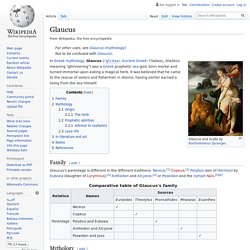
It was believed that he came to the rescue of sailors and fishermen in storms, having earlier earned a living from the sea himself. Family[edit] Mythology[edit] Origin[edit] John Tzetzes adds to the above story that Glaucus became "immortal, but not immune to aging".[15] In an alternate, non-extant version cited in Athenaeus (with reference to Nicander's Aetolian History), Glaucus chased a hare on Mount Oreia until the animal fell down almost dead, then carried his prey to a spring and rubbed it with a bunch of grass that was growing about. The herb[edit] Alexander of Aetolia, cited in Athenaeus, related that the magical herb grew on the island Thrinacia sacred to Helios and served as a remedy against fatigue for the sun god's horses.
Prophetic abilities[edit] Advisor to seafarers[edit] King glaucus. Zeus Heaven: Proteus and Bellerophon. Official walkthrough written by Impressions Games » Episode 1: Boys will be Boys (Lycia) Goals: -Population of 1500 -Support 16 Hoplites or Better -Treasury of 1500 Hints & Tips This is quite a large area so don't worry too much about planning in advance.
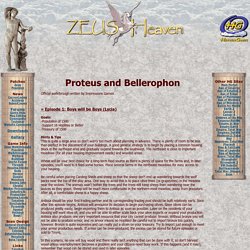
There is plenty of room to be less than perfect in the placement of your buildings. A good general strategy is to begin by placing a common housing block in the northeast area and gradually expand towards the southwest. Wheat will be your best choice for a long-term food source as there is plenty of space for the farms and, in later episodes, you'll need to it feed some horses. Be careful when placing Carding Sheds and sheep so that the sheep don't end up wandering towards the wolf packs near the top of the play area.
Antissa should be your first trading partner and its corresponding trading post should be built relatively early. Shortly after the scenario begins, Chimera will begin attacking cities. Watch your drachmas! Proteus. Illustration of Proteus by Andrea Alciato from The Book of Emblems (1531) In Greek mythology, Proteus (;[1] Ancient Greek: Πρωτεύς, Prōteus) is an early prophetic sea-god or god of rivers and oceanic bodies of water, one of several deities whom Homer calls the "Old Man of the Sea" (halios gerôn).[2] Some who ascribe a specific domain to Proteus call him the god of "elusive sea change", which suggests the constantly changing nature of the sea or the liquid quality of water.
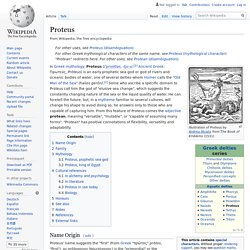
He can foretell the future, but, in a mytheme familiar to several cultures, will change his shape to avoid doing so; he answers only to those who are capable of capturing him. From this feature of Proteus comes the adjective protean, meaning "versatile", "mutable", or "capable of assuming many forms". Proteus. Proteus bellerophon stellvia. MoreEven more from Google Sign in All Images Videos News Maps Tools Any time All results About 7 results Search Results.
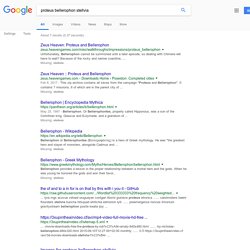
Proteus bellerophon. Hipponounus. Gloucester. City and Non-metropolitan district in England, United Kingdom Gloucester (/ˈɡlɒstər/ ( listen)) is a city and district in Gloucestershire, England, of which it is the county town.
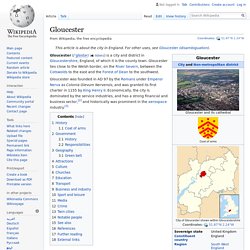
Gloucester lies close to the Welsh border, on the River Severn, between the Cotswolds to the east and the Forest of Dean to the southwest. Gloucester was founded in AD 97 by the Romans under Emperor Nerva as Colonia Glevum Nervensis, and was granted its first charter in 1155 by King Henry II. Economically, the city is dominated by the service industries, and has a strong financial and business sector,[2] and historically was prominent in the aerospace industry.[3]
Gloucester king of corinth the slaying of the chimera. Aphrodite. Aries god of war. Sisyphus and the under world. Sisyphus. Bellerophon and the chimera - Recherche Google.